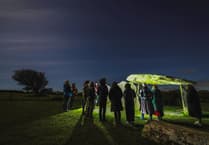Buy local this month
The farming unions are again urging shoppers to keep their Christmas shopping local to show support for rural and local businesses.
For the FUW president Glyn Roberts said: “As we speed towards Christmas, I would like to urge you to think about your rural businesses and see if you can buy local, either for the upcoming Christmas dinner or even gifts for family and friends.
“Speak to your local butcher about meat for the Christmas period and see what your local farm shop has to offer - I promise you will find many of the ingredients you need for your Christmas dinner right on your doorstep.
“There are also plenty of small shops around that offer Welsh craft and locally designed gifts and of course the choice for local food gifts is aplenty - it really is worth having a look. These are small decisions we can make that will have a big impact on our rural economy.
“A pound spent locally will go much further than a pound spent in a chain store and it keeps our rural economies going. By supporting our local businesses we don’t help some highly paid Chief Executive somewhere to buy a third holiday home but we help a local mum and dad put food on the table, a family pay their mortgage, a little girl get those dance lessons and a little boy get his favourite team shirt.”
Time moves on
Now that the population has voted to leave the EU, free trade negotiations are critical to the future of the red meat industry in Wales because exports to the European Union currently account for more than 90 per cent of overseas trade and as much as a third of the Welsh flock, Dai Davies, of Whitland - chairman of Welsh Meat Promotions (HCC) - said in a keynote speech at the Royal Welsh Winter Fair on Monday.
“Exports are absolutely essential to this industry’s future sustainability. Profitability and, most importantly, prices depend on exports. In 2014, £225m worth of Welsh red meat exports went to our mature markets in the EU - that’s nine in every ten export sales.
“With exports accounting for around 35 per cent of all Welsh lamb production, it means that nearly a third of the Welsh flock is sold to the EU nations,” said Mr. Davies who revealed that HCC has overseen growth in exports from around £50m in 2003 to a record peak of £250m two years ago.
“To me, new and emerging markets are hugely exciting, and have tremendous potential for the future, but many of them are a very long way behind the leading mature markets in the European Union. It is not an easy or quick job to break into any new territory; there may be protocols, restrictions and diplomatic conventions, alongside the trade negotiations, that we have to deal with, no matter how world class our product is,” he said.
Mr. Davies, who is standing down as HCC chairman in April, said, that alongside protecting our Eurozone markets, all parts of the red meat supply chain must look forward and together develop the industry.
Report welcomed
A European Commission report has added weight to calls by the farming unions for a collaborative dairy industry that can compete effectively in the UK and on the world markets.
Aled Jones, Milk Board chairman for the NFU in Wales, has been part of an Agriscop group of dairy farmers pushing ahead with work on Dairy Producer Organisations (DPOs) and recently chaired a successful summit on the issue.
The EU Commission report into the impact of the 2009 Milk Package focuses on the important role DPOs can play in increasing farmer bargaining power and it lines up with NFU priorities for fairer, more balanced milk contracts and stronger producer representation
Aled Jones said: “The report reveals that in some EU countries, which have fully adopted the measures within the 2009 package, the dairy farmers’ position in the supply chain has been improved.
“Here in the UK from as far back as 2009, the NFU’s and DairyUK have agreed a voluntary code of conduct on contractual relationships as a preferred route.
“The voluntary approach has led to some improvements but not a wholesale change of behaviour from milk buyers and many farmers continue to be treated unfairly, with contract terms changed with little or no notice and verbal assurances offered by milk buyers but then withdrawn.
“The thrust of the EU report is something NFU has always promoted and encouraged and has actively sought to highlight here in Wales - it is such a shame that many UK milk buyers, both large and small, see what we propose as a threat and have publicly said that they will not work with farmers in this way - what the NFU sees as a vital part of developing new relationships in the UK dairy sector.”
Be always vigilant
Returning to the subject of farm insurance and safety, farmers, together with family members and employees, spend much of their time working in the yard.
“Don’t assume that because you are in the yard, your farmhouse is not at risk. In many burglaries, I have attended as an inspector, the homeowner was present, and perhaps in the rear of the house or yard, at the time of the crime,”says Tim.
He advises: i. If you are working in the yard or sheds, make sure you have locked all the doors. Consider setting the alarm; ii. If you leave an upstairs windows open, make sure it cannot be entered from a porch, drain pipe or a ladder that is left out; iii. If you are working with machinery, be extra vigilant as you may not hear a person arriving and iv. Don’t leave the key under a pot or stone near the door - carry it with you.
Looking to the farmyard itself, as too many farmers know, farm trailers, horseboxes, tractors and other types of farm machinery are targets for criminals, especially if they are left unsecured or in isolated fields.
“Aim to store vehicles as close to your premises as possible, ideally out of sight from passers-by,” Tim says. “That cannot be overemphasised. The best place to store machinery is in a secure shed or, if that is not possible, at least away from nearby roads and easy access.
“Wheel-clamps are available to fit all sizes of wheel and should be used to help prevent trailers, horseboxes other vehicles from being stolen. Locking-posts are an additional feature that can be installed to provide extra security for trailers.
“The bigger block method is very effective; this is quite simply the practice of blocking your trailer with a vehicle or other object that is larger and more difficult to move, in order to prevent it being taken easily.”
Don’t leave keys in tractors or quads or hidden nearby. Store the keys in a secure place.
Marking or customising your farm equipment will deter thieves and will ensure that your property is easily identifiable. It will also help the police to return any recovered property to you in the event of a theft and another excellent idea is to keep receipts, documentation or photographs of your property in a safe place should you be the victim of a theft.
Rugby focus
Some Welsh rugby supporters die, and take the trip to the fiery furnaces of hell.
The devil notices that they’re quite happy, and asks them why.
They explain: “After the lousy weather in Wales, we actually enjoy the warmth.”
The devil thinks: “I’ll fix them,” and turns up the heat. He finds the Kiwis with their shirts off enjoying sausages and chops on a barbeque and having a few tins from the cool-box.
“Whenever the weather gets this good in Wales, we can’t waste it, so this is what we do,” they told Old Nick.
The devil decides to wipe the smile off their faces by turning the heat down to freezing. He returns to the Welsh fans to find them celebrating.
“What now?” he asks.
One explains: “Well, when hell freezes over, we’re sure to win the Rugby World Cup.”




